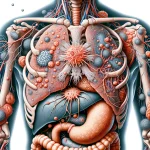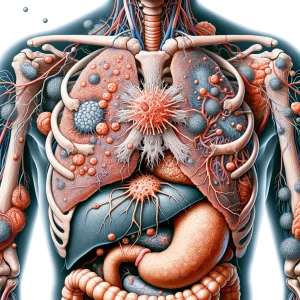What is Brucellosis?
Brucellosis is a systemic infectious disease caused by bacteria belonging to the Brucella genus. It is a classic example of an intracellular infection, meaning the bacteria have the ability to survive and replicate inside the host’s own cells. This capability allows the pathogen to evade aspects of the immune system and establish long-term infections in various parts of the body, including the spleen, liver, and bone marrow.
Clinically, brucellosis is renowned for producing what is known as an undulant fever. This refers to a characteristic pattern where body temperature rises and falls in waves over days or weeks, often accompanied by profuse, drenching sweats, particularly at night. The disease’s origins are firmly rooted in specific animal populations, primarily affecting livestock such as cattle, goats, sheep, and swine.
Causes:- Consumption of Unpasteurized Dairy Products: This is the most common cause of human infection worldwide. Infected goats, sheep, and cattle shed high concentrations of Brucella bacteria into their milk. When this milk is consumed raw, or made into unpasteurized products like soft cheeses, the bacteria are directly ingested and can initiate a systemic infection.
- Inhalation of Aerosolized Particles: The bacteria can become airborne in environments where infected animal tissues are handled. This represents a significant occupational hazard in places like slaughterhouses or laboratories, where dust or fine droplets contaminated with the bacteria can be inhaled directly into the lungs.
- Direct Contact and Inoculation: The bacterium can invade the body through breaks in the skin. Farmers, veterinarians, and meat-processing workers are at risk when they handle infected animal parts, especially reproductive tissues or birthing products, without protective gloves. The bacteria can then enter through minor cuts or abrasions.
- Livestock and Meat Industry Professionals: This is the highest-risk occupational group. It includes large-animal veterinarians, ranchers, farmers, and slaughterhouse workers who have direct, hands-on exposure to infected animals, particularly during birthing or butchering processes where contact with infectious tissues and fluids is likely.
- Consumers of Raw Dairy Products: A significant portion of cases globally is linked to diet. Individuals who consume unpasteurized milk or cheeses (especially soft goat cheese, known as "chèvre") from uncertified sources are at a direct risk of ingesting the Brucella bacteria.
- Laboratory Personnel: Clinical and research microbiologists who handle live cultures of Brucella face a substantial risk of infection. The bacterium is highly infectious when aerosolized, making accidental inhalation in a laboratory setting a well-documented cause of illness.
- Hunters of Specific Game Animals: Individuals who hunt certain wild animals, such as feral swine, elk, or caribou, can be at risk. The field dressing of an infected animal's carcass can lead to exposure through cuts on the hands or through the inhalation of contaminated particles.

